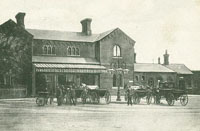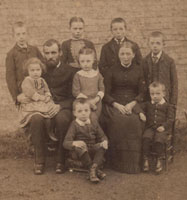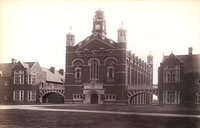
Early working days - My father the chimney sweep
Billy wrote the following recollection some time in the 1950s.
He begins by writing about his father who worked first as a railway
porter at Horsham Station and later as an odd job man. He then
writes about his own early introduction to the world of work
contributing to the family finances by helping his father with the
horse and cart, delivering mail, chalking billiard cues, and
helping with the printing presses at the local newspaper. He
concludes by writing about his apprenticeship in “the three branch
trade’ with Sendall Brothers, a local building and decorating firm
and many of the interesting characters he worked with during this
time.
My father’s people were Steyning folks. He had little or no
education, went to the old National school, learnt to read, write
and do elementary arithmetic, leaving at 8 and working on a
Southdown farm as a ploughboy. Incidentally, many years after he
took me over many miles of uncultivated downland that was ploughed
up and cultivated at the time of the Napoleonic scare till after
the Crimean War days.
About 1860 he left his farm work and started as what we should now
call a juvenile labourer at 12 years for Chapel’s, a building firm
with a London connection and joinery works on the bank south east
of Steyning Station. Four or five years later he secured a job,
then very much sought-after, as Porter at the newly opened Steyning
Station. Later he applied for and obtained a transfer to Horsham
Station.
 Horsham Station, 1905.
Courtesy of West Sussex Past Pictures; Ref: PP/WSL/PC004839; West
Sussex County Council Library Service.
Horsham Station, 1905.
Courtesy of West Sussex Past Pictures; Ref: PP/WSL/PC004839; West
Sussex County Council Library Service.
It seems that he had previously visited Horsham in rather unusual
circumstances. While working on the farm he was detailed to work a
barge, or monkey boat loaded with coal from Shoreham Harbour to
Baybridge Wharf near Knepp Castle ruin, West Grinstead. This wharf
has now disappeared and the stream one could stride over. The barge
was to return laden with corn for a mill at Portslade, but
presumably my Father and his shipmates were not expected to load or
unload, so like all great navigators, they went ashore! They walked
to Horsham and back, some 16 miles. My father was rather impressed
with Horsham hence his application for a transfer.
After serving for a little while as Porter at Horsham Station, my
father had rather a shock. His great friend, one Absalom
Knight[1], hung himself in the shed
at Station. This, I have understood, was on ‘Thanksgiving
Day’[2] for the recovery of the
Prince of Wales from a very serious illness. It was also the day my
mother first set foot in Horsham. These three events had no obvious
significance or connection with each other but, as children, we
were regaled with the strange happenings of Thanksgiving Day by
Mother and in time they were all related in our minds. (In
passing, certain descendants of Absalom K. are in Pulborough
today.) My father applied for and obtained the job as Goods Vanman
and so became a very well-known figure in the town through
delivering and collecting goods for the railway. I still have
recollections of many a ride in his van, even the smell or smells
of the van.
 Henry Trusler Hoad, his wife Eliza
Mary and their eight children, c. 1886. Back row: Henry Samuel,
Amelia Scott, William (Billy) James, Herbert Trusler. Front row:
Helen Louisa, Albert Edward, Catherine Mary, Frederick
Warren.
Henry Trusler Hoad, his wife Eliza
Mary and their eight children, c. 1886. Back row: Henry Samuel,
Amelia Scott, William (Billy) James, Herbert Trusler. Front row:
Helen Louisa, Albert Edward, Catherine Mary, Frederick
Warren.
Sometime about 1884, when I was eleven years old, my father
suddenly left the Railway Company’s service; I never knew in what
circumstances. The matter was never discussed at home. A schoolboy
friend told me my father had “got the sack”! I certainly thought
that he had left under a cloud of some sort and was for years quite
uncomfortable about it. After he had been dead a few years I
happened to mention it to my dear old Aunt Betsy. She assured me
the reason for the old chap leaving a regular job, a strange thing
to do in those days, was simply economic! He needed more money to
keep his large family. He started to work for Peter Petars (a firm
who subsequently built Roedean) as a scaffolder and labourer.
Building was going through something of a boom just then, but soon
the slump came, he was out of work, we kids were often hungry.
Thanks to our good mother we were much better off than many another
labourer’s family. She went out to work at 1/6 per day, took in
washing, made most of our clothes and I had started to earn a
little well before I left school.
One day a friend persuaded my father, who was above all things a
handy man, to start chimney sweeping and so he did. In the course
of years he had a very good connection not only in the town but in
the country houses round about and Christ’s Hospital[3]. Besides this, in the course of time he
had a pony and cart, then a stout cob and light van doing carting
work for various tradesmen, emptying ash pits, selling the ashes
proper at the brick yard and dumping the useless muck, window
cleaning, carpet beating etc. In fact, any sort of odd job that did
not seem to belong to any specific trade he would take on, such as
brushing down the roof and walls of the Parish Church or cleaning
boiler and flues at Waterworks. I and my brothers all lent a hand
at these multitudinous odd jobs. Looking back I seem to have been
always at work but it seemed no hardship at the time and we
gradually became more comfortable in circumstances.
 Big School, Christ’s Hospital,
Horsham 1902.
Courtesy of West Sussex Past Pictures; Ref: PP/WSL/P002010; West
Sussex County Council Library Service; Image credit.
Big School, Christ’s Hospital,
Horsham 1902.
Courtesy of West Sussex Past Pictures; Ref: PP/WSL/P002010; West
Sussex County Council Library Service; Image credit.
Unfortunately, the old chap developed rather a thirst which he
would at times indulge in for a week or 10 days at a spell and then
go on steadily for perhaps months. In time however he became rather
unreliable, the bouts of drinking more frequent, with the result
instead of having a lucrative business as a return for all his
initiative, we were always more or less hard up.
When chimney sweeping etc. was brisk, at spring cleaning time for
instance, I would assist at that job, also at times when the old
chap was thirsty, as a result, there were few houses in and around
Horsham that I have not had intimate knowledge of the flues and
chimneys. At these busy periods, window cleaning, carpet beating
and the like were also in great demand. Then we would employ one of
the odd type of man frequently to be found in a small town, who
never had a regular job yet was always available for any odd job.
Some of these were among the most odd characters I have ever met
and the most lovable and honest. There was Dick Jillary, a big
rough looking chap, really as gentle as a lamb, a little simple
perhaps and the butt of the ultra small. His main job was droving.
As the cattle market was fortnightly and the fairs but four times a
year, Dick’s job as drover was at least uncertain and precarious.
As a drover he was a real professional. He had sticks for every
type of beast. He could no more drive a flock of sheep with his
bullock whopping stick than fly. And as for pigs, which he allowed
were queer cusses to drive, unless one had a proper pig stick –
which was rather like a large pea bough – he simply beat the road
with this hazel branch and would explain, “Yer never wants to touch
a pig, especially an old sow, with a stick. If yer do, ‘undren to
one if she don’t go leaning off arse uppards!” meaning in the
opposite direction. He was able to express himself thus. I remember
him telling me a great tale about one day when driving some
bullocks up Hurst Hill (on the road to Rusper) he looked up and saw
his brother Jack coming down the hill: “And I thought to myself,
says I, what the deuce is Jack doing up here, I thought he was to
home. And it seemed like Jack he looked at me, but when we met it
worn’t ne’er a one of us.”
Incidentally, another bit of drover lore: “It’s no use talking to
bullocks. Unless you cotch them a hell of a clout round the arse
part, they don’t hear you.”
Poor old Dick, he would say things like this and wonder what you
were laughing at. Coming round to the back door of our house one
day just as my mother had taken a batch of little loaves from the
oven, he remarked, “Ah, they be nice little loaves, missus, just
right for biscuit and cheese.” Another time in early spring: “Ah,
the rooks be pairing, there goes three.” Old Chatfield the baker
employed him for a certain job to be done at night and for some
reason refused to pay Dick who complained that he “worked all night
for half-a-crown a day and then never got nuthin’ for it, I reckon
that is something! An’ I did all the dirty work, then he gets
someone else to wheel out the manure!” Again: “I do hear General
Baines is pretty queer, they’ve had two doctors and a musician down
to see him, he won’t last long, what one don’t know t’other
will.”
- [1] Absalom Knight of
Horsham died in the first quarter of 1872 (Free BMD).
- [2] Thanksgiving Day
was held 27th February 1872.
- [3] In 1902 Christ’s
Hospital School was moved from its historic sites in Newgate and
Hertford to a purpose-built site just south of Horsham. Henry
and Billy Hoad were closely involved in the maintenance of the
school buildings over many years.
Share this
page (third party services may set cookies)